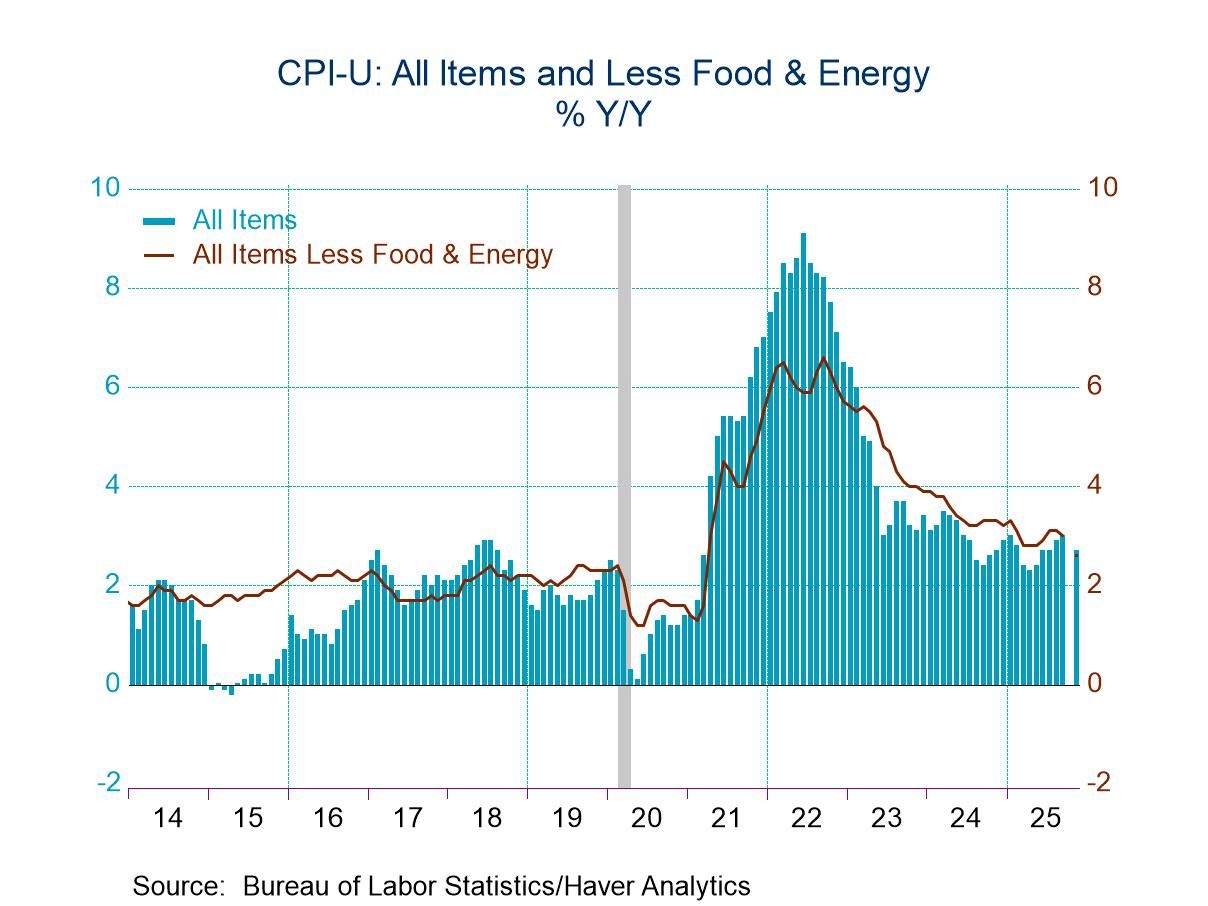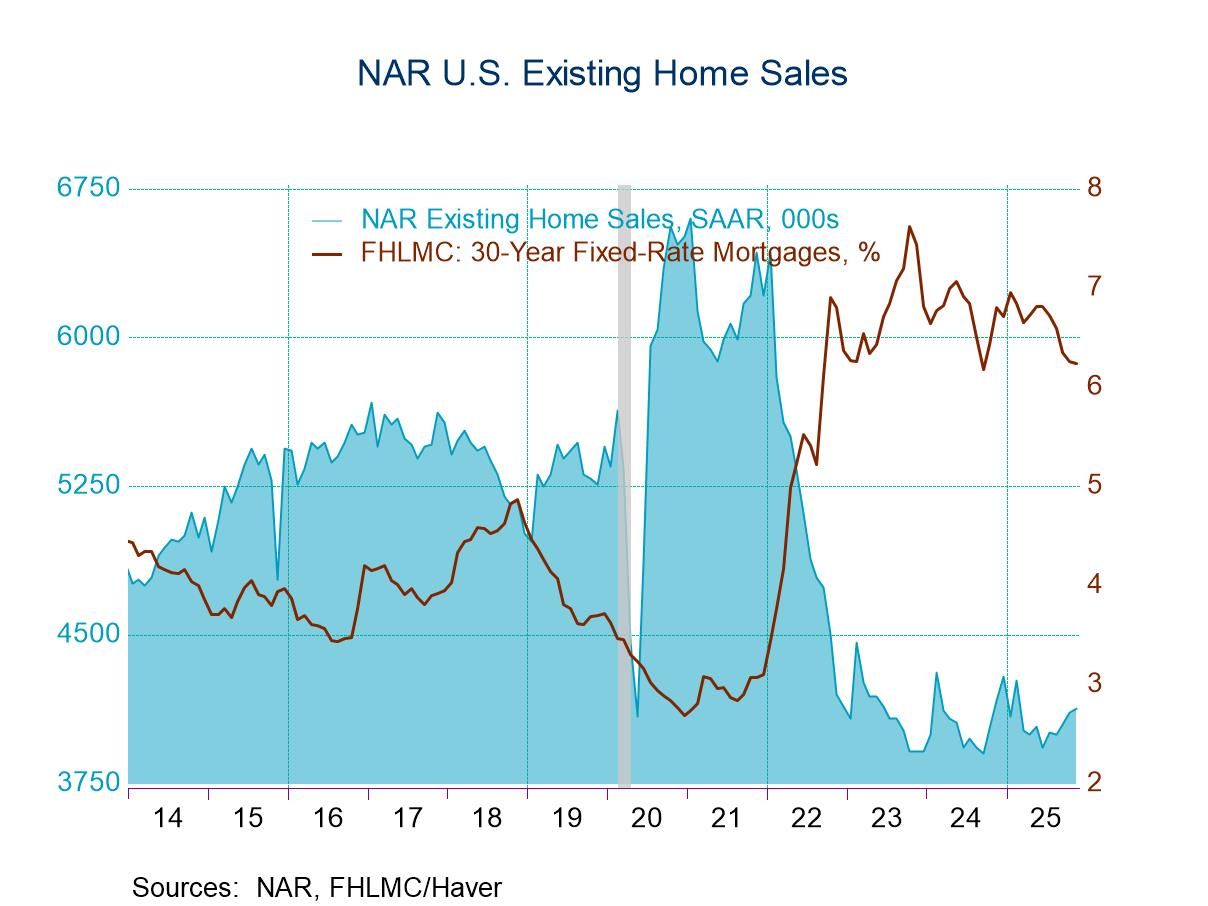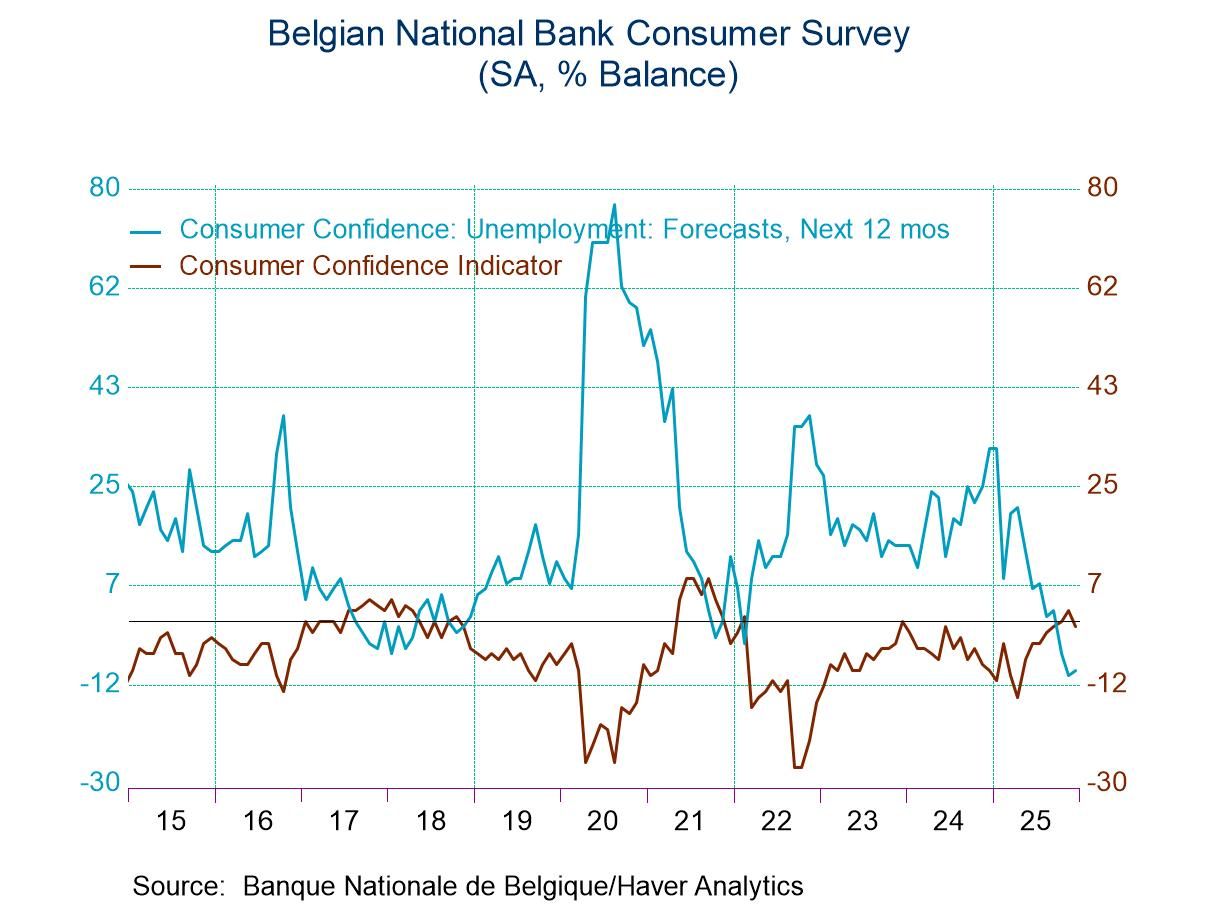 Global| Oct 15 2009
Global| Oct 15 2009CPI Total & Core Increase Just Modestly Despite Economic Improvement
by:Tom Moeller
|in:Economy in Brief
Summary
Despite recent moderate economic improvement, pricing pressure remained very much under control last month as indicated by weak gains in consumer prices. Perhaps the economy's improvement owes much to that weakened pricing power. [...]
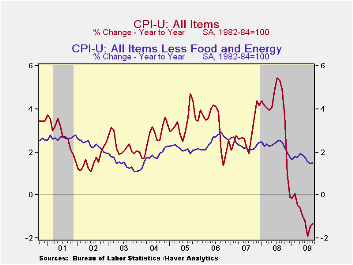
Despite recent moderate economic improvement, pricing pressure remained very much under control last month as indicated by weak gains in consumer prices. Perhaps the economy's improvement owes much to that weakened pricing power. Nevertheless, the overall September CPI matched Consensus expectations and rose 0.2%, half the unrevised August increase. Helped by lower energy prices, the index versus last year declined 1.3% which was near the record for a twelve-month period. Stripping out food & energy prices, the monthly gain of 0.2% was just slightly more than expectations but the y/y increase of 1.5% was the weakest since early-2004.
Earlier strength in energy prices took a breather last month
and rose 0.6% after a 4.6% August increase. Nevertheless, energy prices
during the last three months have risen at a strong 21.1% annual rate.
Gasoline prices rose just 0.1% (-29.7% y/y) after a 9.1% jump during
August. Fuel oil prices were a bit stronger ahead of the winter heating
season. They rose 1.1% (-32.2% y/y) after a 3.9% August gain. Finally,
prices for natural gas & electricity rose just 0.1% (-8.3% y/y)
after no change during the prior month.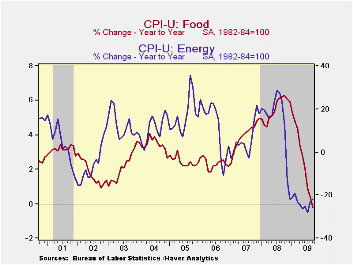
Food & beverage prices also were weak last month and ticked 0.1% lower, reversing a similar August uptick. That left prices roughly unchanged versus September '08. It was the lowest nine-month change since 1967 and down from the peak 6.1% rate of increase last fall. Recent weakness has been led by lower dairy prices (-9.5% y/y) and lower fruit & vegetable (-6.5% y/y) prices. Prices for meats, poultry, fish & eggs also fell by 3.9% y/y while cereals & bakery product prices ticked up just 0.1%.
Gains in the CPI less food & energy also remained moderate. However, the 0.2% September increase was slightly firmer than expected. In addition, price gains accelerated to a 2.0% annual rate since December of last year. That's only slightly below the 2.3% rates of increase during the last two years.
The acceleration in core price inflation this year owes to core
goods prices. Their 0.3% increase last month lifted the
annualized rate so far in 2009 to 2.9% from no change during the prior
two years. Higher tobacco prices account for much of that acceleration
as they have risen at a 38.9% rate since December. However, there has
been modest firming of prices elsewhere. Prices for new & used
motor vehicles have firmed this year despite an aggressive marketing
campaign. They rose 0.5% last month and at a 3.3% rate since December.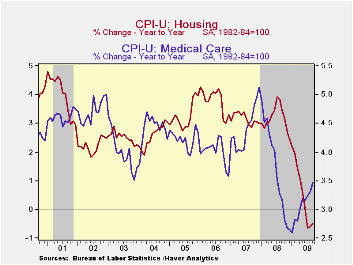 That compares with price deflation during the last two years. Apparel
prices ticked up 0.1% last month and are up at a 3.1% rate this year.
That follows price declines which extend back to 1994. Continuing weak
were prices for household furnishings & operation. They slipped
last month for the fifth month in the last six and are down at a 0.5%
rate so far this year.
That compares with price deflation during the last two years. Apparel
prices ticked up 0.1% last month and are up at a 3.1% rate this year.
That follows price declines which extend back to 1994. Continuing weak
were prices for household furnishings & operation. They slipped
last month for the fifth month in the last six and are down at a 0.5%
rate so far this year.
The U.S. recession continued to sap the strength from core
services prices. They ticked up just 0.1% last month and have
risen at just a 1.6% annual rate so far this year; half that in 2008
and nearly the weakest since 1983. Weakness in the housing market
accounts for much of that moderation. Last month, shelter prices
slipped and they've risen at a just a 0.6% annual rate so far in 2009.
Owners equivalent rent of primary residences, a measure not equivalent
to other house price measures, slipped during September and have risen
at a 1.2% rate so far this year versus a 2.5% 2008 increase. Elsewhere,
public transportation prices posted their third consecutive month of
strength and rose 2.1%.Also firming last month were medical care
services prices with a 0.4% increase and a 3.6% YTD gain. In addition,
education costs have been firm and they're up at a 5.0% annual rate
this year.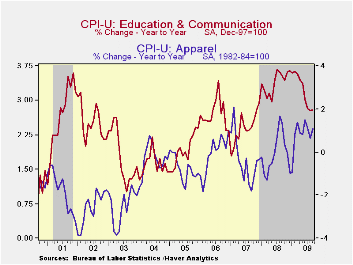
The chained CPI, which adjusts for shifts in consumption patterns, rose 0.1% during September while year-to-year prices fell 1.4%. Conversely, chained prices less food and energy firmed last month by 0.2%, the first material gain in five months and the YTD increase rose to 2.2%.
The consumer price data is available in Haver's USECON database while detailed figures can be found in the CPIDATA database.
The minutes of the latest FOMC meeting can be found here.
| Consumer Price Index (%) | September | August | Y/Y | 2008 | 2007 | 2006 |
|---|---|---|---|---|---|---|
| Total | 0.2 | 0.4 | -1.3 | 3.8 | 2.9 | 3.2 |
| Total less Food & Energy | 0.2 | 0.1 | 1.5 | 2.3 | 2.3 | 2.5 |
| Goods less Food & Energy | 0.3 | -0.3 | 1.6 | 0.1 | -0.4 | 0.2 |
| Services less Energy | 0.1 | 0.2 | 1.5 | 3.1 | 3.4 | 3.4 |
| Energy | 0.6 | 4.6 | -21.9 | 13.5 | 5.7 | 11.0 |
| Food & Beverages | -0.1 | 0.1 | -0.0 | 5.4 | 3.9 | 2.3 |
| Chained CPI: Total (NSA) | 0.1 | 0.2 | -1.4 | 3.3 | 2.5 | 2.9 |
| Total less Food & Energy | 0.2 | 0.1 | 1.1 | 2.0 | 2.0 | 2.2 |
Tom Moeller
AuthorMore in Author Profile »Prior to joining Haver Analytics in 2000, Mr. Moeller worked as the Economist at Chancellor Capital Management from 1985 to 1999. There, he developed comprehensive economic forecasts and interpreted economic data for equity and fixed income portfolio managers. Also at Chancellor, Mr. Moeller worked as an equity analyst and was responsible for researching and rating companies in the economically sensitive automobile and housing industries for investment in Chancellor’s equity portfolio. Prior to joining Chancellor, Mr. Moeller was an Economist at Citibank from 1979 to 1984. He also analyzed pricing behavior in the metals industry for the Council on Wage and Price Stability in Washington, D.C. In 1999, Mr. Moeller received the award for most accurate forecast from the Forecasters' Club of New York. From 1990 to 1992 he was President of the New York Association for Business Economists. Mr. Moeller earned an M.B.A. in Finance from Fordham University, where he graduated in 1987. He holds a Bachelor of Arts in Economics from George Washington University.



